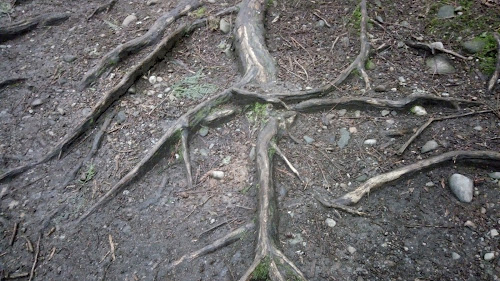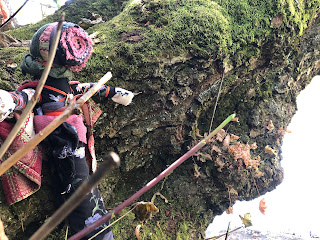Ceremonies of Reparation -- Ceremony #4
Ceremonies of Reparation
For those interested in the background of these
ceremonies, please refer to the September 8, 2021 blog entry.
Ceremony #4, Dec. 4, 2021
BACKGROUND
Dark moon in the darkening season – the time of double
darkness! In Ukrainian traditions, this
date also signifies the full arrival of the Spirit of Winter. All crops, herbs and medicines are to be
dried, hung, processed, and stored by this date. Divination is commonly done on this day, and
one form of divination calls on the elementals of fire and water as helpers.
In older times, young women would light a fire, and once
2 of the branches were well caught with fire, those branches would be set atop the
mouth of an empty vessel. Water from
another vessel would be poured between the flaming sticks while prayers were
whispered or spoken (often, though not always, prayers to find a mate). The water would then be used as a “wash” each
day – bathing themselves in the empowered and vitalized prayer.
Water for the ceremony would have been gathered from three
separate sources of wild water (water that is “alive” and remembers where it
came from), or, from a running source of water (river or creek) that diverges
or converges into/from two or three tributaries – three being considered “best”
or most powerful.
Both fire and water are life-gifting. In fact, water in its higher magical form in
Slavic lore is called both “Water of Life” and “Water of Death” to signify its
ability to confer either life or death.
Fire is similar in its ability to “eat” source materials (granting them
death) and transform them into heat and light (granting them new or
re-incarnated life). According to old Slavic
calendar systems, there were two main seasons – the season of fire, and the
season of water. Thus, with this double
darkness, we have fully stepped from the season of sun to the season of water.
Each year, during the darkening season, I usually ask
apprentices and journeyers to join together in holding Prayer Fires
simultaneously from wherever they are living on the dark moon and again on the
Solstice. It seemed beautifully aligned,
then, to combine Prayer Fire with the land reparation ceremony this day.
When we first moved to our current location, I felt quite
bereft that there were no accessible trees for me to pray and do ceremony
with. In fact, I felt like a fish our of
water. While I love the open view to the
night sky, the lack of accessible trees and nearby trails was quite challenging. Young trees, or cultivated trees simply do not speak the same
language. If you have ever read “Women
Who Run with Wolves” by Clarissa Pinkola Estés, I felt like the main character in the story “Seal
Skin, Soul Skin.” (A quick overview: the
main character is a Selkie who can appear as a seal when wearing her skin, or a
woman if she is disrobed. A lonely man
finds her sealskin one night while observing she and other Selkie’s dancing in
the moonlight. He steals her sealskin and only agrees to give it back to her –
7 years in the future – if she will be his wife during that time. She agrees and comes to love and have a child
with him. As the 7th year
approaches, she begins to “dry up” and wither, her soul-force draining. >> Being distanced from accessible older
trees and wild spaces feels similar to me, like I am withering and drying up…)
At night, during offerings and prayer, I would give thanks to the trees I could see, whom I called the “guardians” of the property who roughly sit in the four cardinal directions and framed my awareness: one lone Hawthorn tree in the sheep field just behind our home (South); a grouping of thin poplars at the far end of the cattle field (West); tall trees in the cattle field next to the landlord’s home whose silhouettes are welcome sights at night (North); and a young ornamental plum tree newly planted next to our home-spot when we moved here (East). All else is field, garden, and a splattering of fruit trees near the landlord’s home.
One night,
early in our stay on the property, I touched the grass as I gazed at the moon
and asked to connect more deeply with the land, and spirits and ancestors of
the land so that I might know how best to serve them. That night, a dream was given – partly symbolic,
partly “truth.”
In the dream, I was a worker, staying on the property along
with my husband and a dozen other workers.
It was, more or less, 150 years ago and there was forest over the entire
area, except for this particular property, where a swath of the forest had been
clear-cut. Trees still towered on the
sides of the swath, but the cutting ground was barren – peat-like dry soil was
underfoot, and we were somehow expected to work the ground into fertile garden.
The chief of the local Nation lived down the hillside, located
off the north side of the property. He
had directed the tribes members to dig a tunnel into the hillside to access the
underground river/ aquifer just under the property. Xwulqw’selu Sto’lo, the Koksilah River, where
they were living next to, was running too low in water – they would not be able
to survive unless the water levels rose.
The owner of the property approached me to say that I was to
go to the Chief, and if I were to introduce myself properly, he would gift me
an armload of firewood. I was not to go by
myself as no “single” women could address the Chief – my husband would need to go
with me.
I
immediately began to research the dream.
Looking up the Quw’utsun’ name of the river (which is the river I was
next to in Ceremony #1) brought me to finding a research report on the river
watershed along with some historical information. It was from this report that I learned two
important pieces of information:
1)
Xwulqw’selu Sto’lo is only fed by ground water – there are no
lakes that adjoin, feed, or regulate its flow.
The water, therefore, is cooler than other lake-fed rivers. And, the trees and aquifers of its watershed
are vital to its health.
2)
The place the Chief and tribes members were located in my
dream was, historically, a winter camp for the Quw’utsun’ peoples, located where
Highway 1 meets the Koksilah River, also called Xwulqw’selu (which means place
having snags, or place causing tangles, referring to log jams along the river
near the winter camp). [ https://www.koksilahwater.ca/watershed ; https://sites.google.com/a/cowichanstation.org/koksilah-watershed-working-group/kwg-reports/watershed-report-1
; https://cowichantribes.com/about-cowichan-tribes/history/pre-european-contact
]
Since I had no prior knowledge of these things, I knew
that the land and ancestors had spoken directly to me in the dream, and that it
was up to me to figure out and follow through with what they were asking in
return. I now had an understanding of
the beginning and middle of the dream, but the firewood/ ending was difficult
to grasp. However, because these are the
ancestors of the land and Quw’utsun’ peoples, I felt it was not my place to
interpret their message and request – I needed to consult an elder.
I asked one elder, medicine woman Della, who then
referred me to another elder, Qwiahwultuhw, whom she thought might know stories
about the area that may give a clue. When
I relayed the dream and my understandings so far to Qwiahwultuhw, and asked his
thoughts about the firewood, he was thoughtful for a moment and then explained
that because the Koksilah is colder then other rivers, and because this is a
winter camp, he felt the ancestors may be asking for light and warmth, and he
suggested offering them this light and warmth through my prayers and recognition.
So, as I pray each night, I offer them my thoughts, prayers,
breath, obkuryuvannya (smoke), and sometimes candles to warm them.
CEREMONY
With these things in mind, I set out on the afternoon of
the 4th to the site of Ceremony #1 where I could more easily access
the river. This past summer, the river
next to this spot was barely a trickle (see first river photo).
We recently experienced a flooding, which dramatically changed the
river-scape. A new “sandbar” appeared,
and so walking out toward the tip of the sandbar I found, on the other side,
several divergences and meetings of the river pathway. It was from here that I gathered cold river
water, with gratitude. (see second and third photos -- 2nd photo taken in the exact same spot and first photo)
I waited until nightfall when my family members were
winding down toward sleep and I took a long shower. As I did so, I gave thanks to the waters that
bathed me – waters that come from a well connected to the underground river and
aquifer of my dream. Then, as I walked
to the garden which was cloaked in darkness, I placed my ceremony basket next
to the Wormwood plant. Wormwood is important
physical and spiritual plant to the Ukrainian people, used in medicinal teas
and burned for cleansing and protection.
A small Datura had seeded itself under the Wormwood this past year – a descendent
of the Datura that had been planted there the year previous – and though it
hadn’t grown very large in the shade, I still recognized her as an emanation of
Dark Ma. This seemed the most fitting
spot for ceremony.
I pulled out the pysanka I had made for this land:
- one side to honour the Tree Guardians and tree
ancestors who once resided here;
- the other side to honour Fire, to warm the ancestors of the land and to mark Prayer Fire ceremony;
- the band showing the river waters, the spiral as representing the place of tangles/ winter camp, and the flames to warm the ancestors;
- the top to honour the night sky and star-companions;
- the bottom (depicting an eye) to represent how
we view the land, the beings of the land, the ancestors, shared responsibility,
and how we view one another as community on shared land.
I stood with pysanka in-and and wondered where to bury
it. In that moment, I heard a “crack”
sound from the location of the Hawthorn tree and knew my destination.
After burying the pysanka, I returned to the Wormwood and Datura. Months previous I had placed a flat piece of granite here as a small altar. Upon this I placed two beeswax candles – each a gift from students. Lifting the matches, I made prayers to the Fire Spirit, lit the candles with gratitude to the bees as well as the spirits of this place. As I poured water from the Koksilah between the flames and onto the granite and ground, I prayed and gave thanks to water, the ancestors, and the peoples of this land. I asked that these waters be carried into the earth and then into the underground river, for its healing. I asked that it feed the plants and forest on the adjacent reserve and help keep the river healthy. When all of the water was poured, I proceeded with Prayer Fire – carrying prayers requested by students and friends, and then personal prayers to the Fire. When everything was complete, I lit obkuryuvannya, offering the smoke to the tree guardians and ancestors – those of the land, and also my own ancestors. Silence and peace fell upon the garden. All was complete.


















Comments
Post a Comment